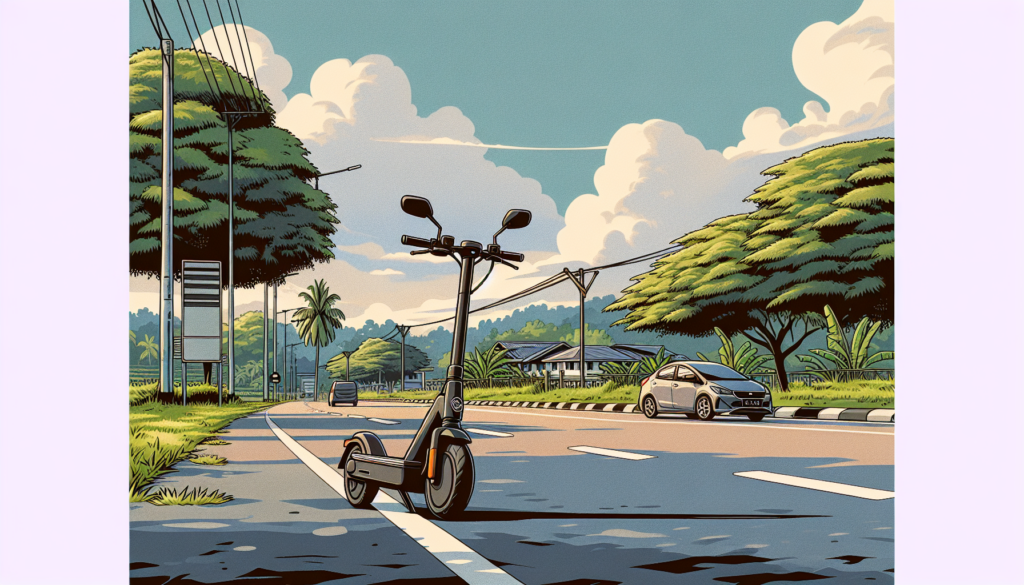
As urban transportation continues to evolve, the rise of electric scooters offers a convenient and eco-friendly alternative for commuters in Malaysia. However, the legality of e-scooters on public roads and paths remains a topic of significant discussion among users and policymakers alike. With the increasing popularity of these devices, it becomes vital to understand the regulations and laws that govern their use in Malaysia, ensuring both safety and compliance. In this blog, we will dive into the key aspects of e-scooter legality, addressing common concerns and providing clarity on this modern mode of transportation.
Overview of E-Scooter Regulations in Malaysia

In Malaysia, the burgeoning popularity of e-scooters has prompted the authorities to lay down specific regulations to ensure the safety of riders and pedestrians alike. The government has recognized the potential of e-scooters as a sustainable mode of transportation but also aims to address the concerns surrounding their use. As of now, e-scooters are legal in Malaysia, provided they adhere to certain regulations. These include requirements such as having a maximum speed limit, being equipped with lights and reflectors, and operating on designated paths. Riders must also be at least 16 years old and are recommended to wear helmets for safety.
Enforcement of these rules is crucial to maintaining order on the roads and pathways, and local municipalities are often empowered to set additional rules to fit their unique urban landscapes. However, the legislation surrounding e-scooters may continue to evolve as usage patterns change and technology advances. Local councils and stakeholders are actively discussing the implementation of more comprehensive guidelines to manage e-scooters better in urban environments. It is essential for riders to stay informed about the latest regulations to ensure compliance and promote safe riding practices. As the e-scooter market continues to grow, understanding these laws will help users navigate the legal landscape effectively while enjoying the advantages of this convenient transportation option.
Types of E-Scooters Permitted
In Malaysia, the legality of e-scooters hinges on specific categories defined by local regulations. According to the Ministry of Transport, electric scooters fall into the classification of personal mobility devices (PMDs). The types of e-scooters that are permitted are those that conform to strict specifications, which generally include age restrictions on users, maximum speed limits, and weight limits of the scooter itself. Notably, e-scooters that have a top speed of not more than 25 km/h and a weight limit of less than 60 kilograms are typically the ones allowed for use on roads and designated pathways. Adhering to these guidelines ensures not only compliance with Malaysian laws but also the safety of riders.
Moreover, users of e-scooters must also observe local laws concerning helmet use and must strictly avoid high-traffic roadways where such devices are prohibited. Various local councils may have additional regulations or restrictions in specific areas, which can impact where an e-scooter can be legally operated. Therefore, it’s essential for potential users to check with their local authorities to ensure that they are fully compliant. Understanding these regulations can help prevent legal issues and promote safe riding practices throughout Malaysia.
Age and Licensing Requirements for E-Scooter Riders
In Malaysia, the age and licensing requirements for e-scooter riders are crucial for ensuring safety on the roads. According to the existing regulations, riders must be at least 16 years old to legally operate an e-scooter. This age limit is intended to ensure that riders have a certain level of maturity and understanding of road safety. However, it is also essential for riders to be aware of the specifications and limitations of their electric scooters, such as weight and speed, as they vary according to local laws. Riders under the age of 18 are also required to wear a helmet while riding, further emphasizing the importance of safety precautions for younger riders.
Moreover, as of now, there is no specific license required to ride an electric scooter in Malaysia, which makes it more accessible for users. However, when using an electric scooter, riders must adhere to the general traffic laws and regulations of the country. This includes riding in designated lanes and avoiding high-traffic areas to ensure a smooth riding experience. Awareness of these requirements can help prevent potential legal issues while promoting a safer environment for all road users in Malaysia.
Safety Gear and Usage Rules for Electric Scooters
In Malaysia, the usage of electric scooters is governed by specific rules aimed at ensuring safety for riders and pedestrians alike. Riders are strongly encouraged to wear safety gear such as helmets, knee pads, and elbow pads to minimize injuries in case of falls or accidents. Additionally, it is crucial for riders to observe the designated lanes and paths for electric scooters. Many urban areas in Malaysia have implemented dedicated cycling paths to facilitate safer travel, promoting both safety and efficiency. Following these regulations not only protects the rider but also enhances the overall image of electric scooters as a responsible mode of transportation.
To further promote safety, electric scooter users must adhere to speed regulations and avoid crowded areas where pedestrian traffic is high. Riders should also refrain from riding on sidewalks, as this could lead to accidents with pedestrians. The enforcement of these rules is taken seriously by local authorities, with penalties for violations aimed at encouraging responsible riding practices. As electric scooters continue to rise in popularity across Malaysia, understanding these safety gear and usage regulations is vital for both current and prospective riders to ensure a safe riding experience.
Designated Areas for Riding Electric Scooters

In Malaysia, the legality of riding electric scooters is primarily determined by specified designated areas. These areas are typically set up to promote safety and ensure that electric scooter users do not interfere with pedestrian traffic or other vehicles. Many urban centers, such as Kuala Lumpur, have designated bicycle lanes where electric scooters are allowed, encouraging riders to stay within safe boundaries. It’s essential for riders to be informed about these specific zones to avoid any legal repercussions and ensure a pleasant riding experience. Local councils may also have differing regulations about where electric scooters are permitted, so it’s beneficial to check for local guidelines before setting out on a ride.
Additionally, as the popularity of electric scooters continues to rise, authorities are actively developing infrastructure to accommodate them. Pilot programs and community initiatives are increasingly being introduced to establish more designated riding areas. These efforts aim to foster a safer environment for both scooter enthusiasts and pedestrians alike. Riders should remain vigilant about adhering to local laws and regulations concerning electric scooters, as they can vary from one region to another in Malaysia. Staying informed can contribute to a harmonious coexistence of electric scooters in urban transport systems.
Consequences of Violating Electric Scooter Laws
In Malaysia, the legal framework surrounding electric scooters is becoming increasingly defined, and violating these laws can lead to serious consequences. Riders who operate electric scooters in prohibited areas or without the required safety gear risk facing fines or penalties imposed by the authorities. This legal stance is primarily to ensure safety on the roads, especially in high-traffic areas where the risk of accidents is heightened. Local enforcement is vigilant, and reports of individuals being ticketed for breaching the established regulations are becoming more common. Thus, it is crucial for electric scooter users to stay informed about the laws to avoid unnecessary legal trouble.
Additionally, as enforcement becomes stricter, the potential repercussions extend beyond just financial penalties. Repeated violations of electric scooter regulations could lead to the suspension of riding privileges or, in some cases, having the electric scooter impounded. More importantly, these infractions could affect the public perception of electric scooters, potentially leading to tighter regulations in the future. For riders, adhering to the law is not just about avoiding fines; it is about contributing to a safer environment for all road users and maintaining the right to use electric scooters freely and legally in Malaysia.
Recent Developments in Electric Scooter Legislation
In recent years, the legality of electric scooters in Malaysia has undergone significant changes, reflecting the growing popularity of these eco-friendly vehicles. The Ministry of Transport has proposed regulations that aim to distinguish between bicycles and electric scooters, creating a clearer framework for their use on public roads. This shift is driven by the need to adapt to advancements in personal mobility solutions while ensuring public safety. As of 2023, electric scooters are largely permitted, with specific guidelines governing their speed, the weight of the vehicle, and infrastructure requirements. The government is actively working on implementing designated lanes for electric scooters to facilitate safer commuting options for riders.
Comparative Analysis with Other Countries’ Electric Scooter Laws
When assessing the legality of electric scooters in Malaysia, it is beneficial to perform a comparative analysis with other countries that have established regulations surrounding their use. In many European countries, such as France and Germany, electric scooters are treated similarly to bicycles, allowing for their use on dedicated bike lanes and public roads, provided they adhere to speed limits and safety regulations. Meanwhile, in the United States, laws vary significantly by state; some allow electric scooters to share roads with motor vehicles, while others have designated areas for e-scooter use. This variability underscores the importance of understanding local regulations, as they greatly influence the adoption and use of electric scooters.
In contrast, Malaysia has been slower to formalize its electric scooter laws, resulting in a somewhat ambiguous legal landscape. While scooters are increasingly popular for personal transportation, the lack of comprehensive regulations can lead to confusion and, in some cases, safety concerns. Countries that have embraced electric scooters through clear legislation often exhibit higher rider safety and broader acceptance. Therefore, for Malaysia to catch up, it may need to adopt elements from these countries’ frameworks, balancing innovation in personal mobility with safety and operational guidelines. This could facilitate a more structured and safe integration of electric scooters into urban transport networks.
Final Thoughts on Electric Scooters in Malaysia
In summary, the legality of electric scooters in Malaysia presents a mixed landscape that varies across different states and municipalities. While some areas may welcome the use of electric scooters with open arms, others might implement stricter regulations. It is essential for users to stay informed about local laws and guidelines to ensure a smooth and lawful riding experience. The growing popularity of electric scooters highlights the need for clarity and coherence in legislation that governs their use, ensuring safety for both riders and pedestrians.
As Malaysia continues to embrace technological advancements and greener transportation options, the conversation around electric scooters will likely evolve. Relying on regulations that prioritize safety while promoting the use of electric scooters could pave the way for a more eco-friendly urban environment. Riders should remain proactive in advocating for reasonable laws that enhance safety while also enjoying the benefits of this convenient mode of transportation. For those looking to own an e-scooter and explore safe, lawful riding, Ekolife Malaysia is here to help. Discover quality e-scooters and receive guidance from our team to ensure a riding experience that’s both regulation-compliant and eco-friendly.

Still empty, when is the actual blog coming out?
Hello Amy, I apologize for the confusion. It seems that the blog post hasn’t been published yet. Our team is working hard to prepare a comprehensive and informative article that meets your expectations. Thank you for your patience and understanding. If you have any further questions or concerns, please don’t hesitate to reach out to us at [email protected] or +60 3-7890 3042.
Just another example of unfinished business online. Good luck, let’s see when it’s ready!
Thank you for your comment, Ryan. Sorry to hear that you feel we’ve left our online presence unfinished. Our goal at Eko Life Malaysia is to provide comprehensive information and services to our customers. We appreciate your patience and understanding. If you have any specific suggestions or concerns, please feel free to share them with us. You can reach us at [email protected] or +60 3-7890 3042. We look forward to being of assistance. We will work to get our online presence up and ready soon.
So frustrating when the content is not available. Hope it gets updated soon!
Sorry to hear that the content isn’t available, Eric. We appreciate your feedback and will pass it on to our team to prioritize an update. In the meantime, please feel free to reach out to us at [email protected] or +60 3-7890 3042 for any assistance or to inquire about our products and services.